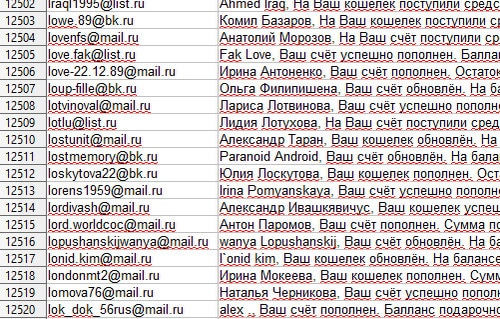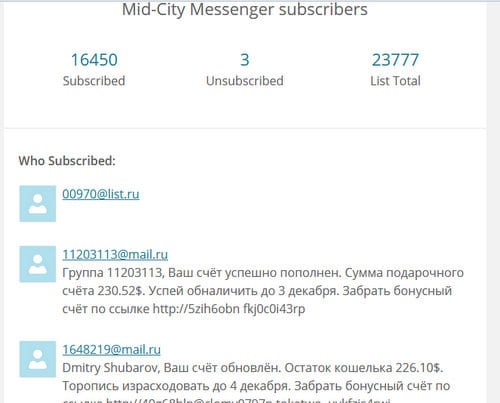
A sample of the email addresses that subscribed to MidCityMessenger.com. (image by UptownMessenger.com)
While the tales of Russian intrigue embroiling Washington may seem far from the potholes and politics of New Orleans, the country’s mysterious interest in the news landed right at home this week when thousands of new subscribers with Russian email addresses signed up for the daily headlines from our sister site at Mid-City Messenger.
The Russian email addresses first began signing up to receive the daily email from Mid-City Messenger over the weekend, but the pace accelerated abruptly on Sunday when 16,450 new subscribers arrived overnight — all ending in the -.ru Russian domain.

(screen grab by UptownMessenger.com)
The Mid-City Messenger daily email had to be paused Monday while the intrusive emails were cleaned from the list, but the list has now been restored to its proper size. No data on other subscribers was taken from Mid-City Messenger email list — the incident solely consisted of an influx of new subscribers from Russia. Curiously, neither the Uptown Messenger nor Gentilly Messenger lists (which are separate) have drawn any Russian interest.
Why the Russian emails began subscribing remains unclear, of course, but it appears to be different from the tales of hacking that the public may be familiar with. Unlike a hack, which seeks to gain control of a website to either alter its content, advertise a product or make other changes, there is no way to access a website like Mid-City Messenger through its mailing list.
One theory into the possible interest by Russian bots in receiving local news from communities like Mid-City is to create fake online personas to distribute other propaganda or false information via social media, according to a 2015 investigation by the New York Times. First, the bots create fake social-media accounts for themselves on sites like Facebook or Twitter. Then, they post links to real news articles — like those from Mid-City Messenger — to those accounts, creating the appearance of a real person from that community. Finally, they then distribute the false news from other sites through the same social media accounts, in hopes that the fake news will appear more credible when it appears alongside articles from trusted sources.
After we tweeted about the experience with the Russian emails on Monday morning, the incident drew the attention of our partners at WWL-TV. See the report by Jacquelyn Qunyh below, including her interview with a cyber-security expert about the issue.